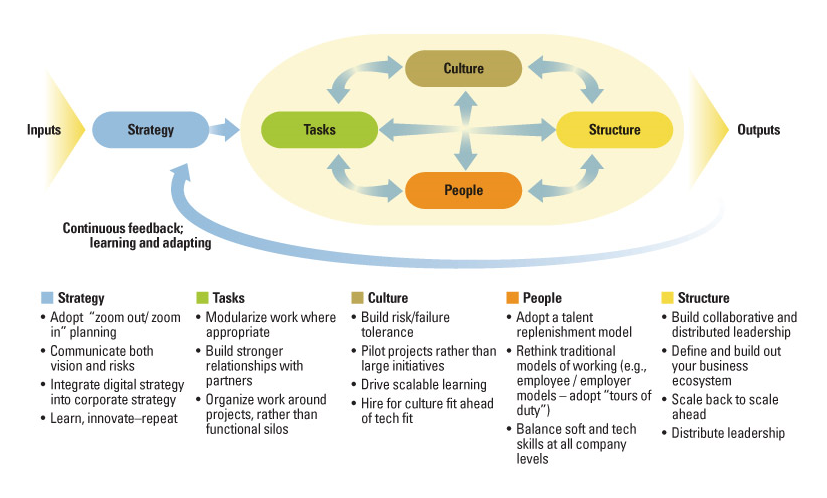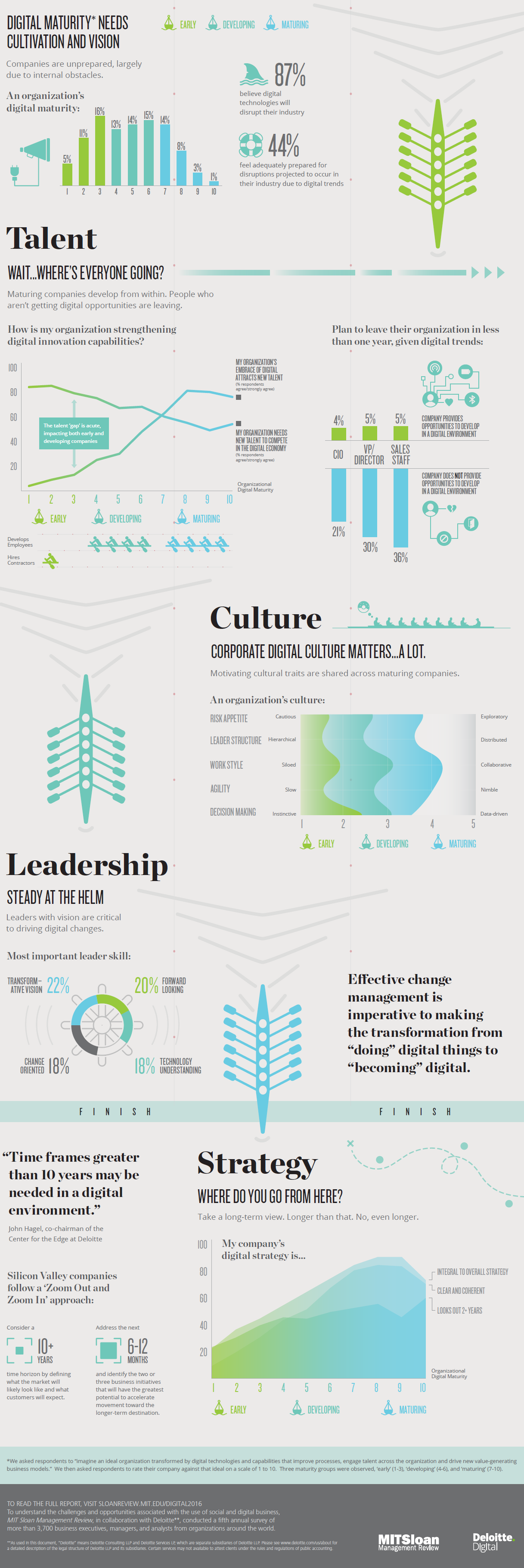To understand the challenges and opportunities associated with digitalization, MIT Sloan Management Review and Deloitte surveyed more than 3,700 business executives, managers, and analysts from organizations around the world. They have recently published their findings in a report, titled “Aligning the Organization for Its Digital Future“.
Some key outcomes (quoted and depicted in an infographic) as well as conclusive remarks in the following:
Creating an effective digital culture is an intentional effort: Digitally maturing companies are constantly cultivating their cultures. Nearly 80% of respondents from digitally maturing companies say their companies are actively engaged in efforts to bolster risk taking, agility, and collaboration. Only 23% of companies at the early stages of digital development are doing so.
Senior-level talent appears more committed to digitally maturing enterprises: Companies that give their senior vice presidents, vice presidents, and director-level leaders the resources and opportunities to develop themselves in a digital environment are more likely to retain their talent. In contrast, approximately 30% of such leaders who lack such opportunities are planning to find new jobs in less than one year.
Digitally maturing organizations invest in their own talent: More than 75% of digitally maturing organizations surveyed provide their employees with resources and opportunities to develop their digital acumen, compared to only 14% of early-stage companies. Success appears to breed success — 71% of digitally maturing companies say they are able to attract new talent based on their use of digital, while only 10% of their early-stage peers can do so.
Soft skills trump technology knowledge in driving digital transformation: When asked about the most important skill for leaders to succeed in a digital environment, only 18% of respondents listed technological skills as most important. Instead, they highlighted managerial attributes such as having a transformative vision (22%), being a forward thinker (20%), having a change-oriented mindset (18%), or other leadership and collaborative skills (22%). A similar emphasis on organizational skills above technical ones for succeeding in digital environments was also reported for employees.
Digital congruence is the crux: To navigate the complexity of digital business, companies should consider embracing what we call digital congruence — culture, people, structure, and tasks aligned with each other, company strategy, and the challenges of a constantly changing digital landscape. For example, a conservative and hierarchical organization populated with energetic entrepreneurs may not be able to harness their drive and energy. Similarly, an organization with a flat and nimble structure may still struggle if its culture fears risk. When culture, people, structure, and tasks are firing in sync, however, businesses can move forward successfully and confidently (see exhibit below).
Takeaway
Digitally maturing organizations across different industries have organizational cultures that share some common features. The main characteristics include:
- expanded appetite for risk
- rapid experimentation
- heavy investment in talent
- recruiting and developing leaders who excel at “soft”, rather than technology skills.
Aligning organizations for Digital Transformation requires developing digital capabilities in which a company’s activities, people, culture, and structure are in sync and aligned toward a set of organizational goals.
Therefore, Digital Transformation – very similar to innovation – is first and foremost a leadership issue. Future-proof leaders (-to-be) have to inevitably set the digital scene according to these requirements. Otherwise, they ultimately put themselves at risk of managing digital initiatives in their organizations that either take the form of projects or are limited to activities within a given division, function, or channel.


2 Responses to Aligning Organizations for Digital Transformation